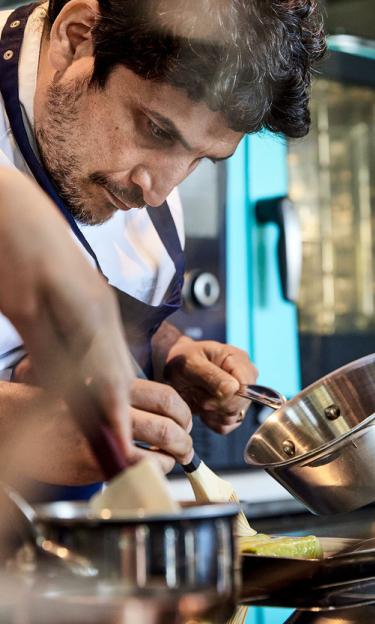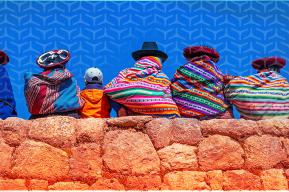Idea
Mauro Colagreco: “I like to think of myself as a gardener in a chef's jacket”

From nature to table: rethinking the relationship between our food and the land
I’m the Chef at the Mirazur Restaurant in Menton in the south of France, and I like to think of myself as a gardener in a chef's jacket.
When I arrived at Mirazur, there was only a garden in front of the restaurant. I had my aromatic herbs, flowers, some lemon trees. Today, there are five gardens that we cultivate using permaculture and following the biodynamic calendar.
It is this evolution of the agricultural project that has changed our way of experimenting, and helped us to rethink the relationship between the restaurant and the gardens: before we used to say that we had a restaurant with a garden, now it is the opposite, it is a large vegetable garden divided into several patches with a restaurant.
Cooking has allowed me to reconnect with working the land, and it is this work with nature that gives rhythm and inspiration to my dishes. The straight line has become a full circle. Today, it is impossible for me to imagine one without the other.
With this work, we are committed to soil regeneration and the preservation of biodiversity. It is about sustainable cultivation and consumption methods. We are convinced that we can all have a real impact on our ecosystems through our consumption practices and our choices when it comes to food.
My work - our work - is not an end in and of itself; it is a means to contribute to the change we need to move forward together towards a more planet-friendly model.
How does a chef from Argentina end up creating a three Michelin star restaurant on the French-Italian border?
I started my culinary studies in Argentina, and I arrived in France in 2001 to continue my education and training with the idea of returning to my country one day. Historically, France is the country of gastronomy, and it is an almost obligatory stopover in the career of a chef.
When I arrived, I was amazed by the culture, the diversity of the products and their quality. Over time, I realised that it is this appreciation of culinary traditions that also encourages a respectful and thoughtful relationship between chefs and products.
In 2006, when I wanted to open my own restaurant, I didn't think of Menton. It was through friends that I heard about an establishment, just on the border between France and Italy, which had been closed for a few years... and it seemed like a great opportunity. I immediately fell in love with this place suspended between the mountain and the sea in the middle of exuberant vegetation - the place that later became the Mirazur.
What motivated you to develop a more sustainable approach, and how does that translate into your food?
I have always had enormous respect for the produce, and the cycle of the seasons. In my family, the notion of sharing is essential, and we used to cook and gather around meals prepared by my parents and grandparents. Beyond the products, nature has always been a way for me to recharge my batteries, to inspire myself and my cooking.
It was therefore natural for me to work in a way that respects and celebrates the nature that's around me. I went to meet local producers, I wanted to share a kind of landscape through my dishes. The more I get my hands dirty in the earth, the more I want to go even further: in knowledge, in cultivation methods, in products... it's a path that has no end, it's a way of living and of conceiving my work.
I am very lucky to have a restaurant in a place with such impressive natural beauty, and I feel immense gratitude. The desire to integrate this landscape into the dining experience was obvious to me from the start. The work in the kitchen and gardens, with local producers and their produce, is just an expression of this desire and its evolution over the years.
Our approach is centered on respecting our ecosystems and implementing practices that help us reconnect with nature and convey a message of beauty and hope for the future. Working in our permaculture gardens, we improve the soil and regenerate life. It is a practice inspired by the observation of nature and a holistic vision where all the components of the system are important and interconnected. It is also about seeing the earth as a living organism and finding our place within nature.
The campaign to end the use of single-use plastics in our restaurant came from this need to preserve the health and biodiversity of our seas, and to draw attention to an issue that is universal, as plastic is everywhere.
From the beginning, we chose to work with local fishermen and producers who had respectful practices on their land. For us, this is the way to value their work while having access to excellent and unique products. What we want to convey through our experience is that the origin of the products has a direct impact on the quality of our creations. From the earth to the plate, there's a direct link.
Is this approach unique to Mirazur?
It's a philosophy that we try to replicate in all our projects and establishments. It's not something that's reserved for Mirazur or for high gastronomy establishments. Every restaurant we open abroad is based on local products and producers, we try to integrate ourselves as much as possible in the different places where we are. Today we have several restaurants in France, Singapore, Thailand, Dubai, the United States, and planned openings in London and Japan.
What do you hope to achieve as UNESCO Goodwill Ambassador for Biodiversity?
It is a huge honour and a wonderful opportunity to have this recognition and show of support from UNESCO. The fact that this nomination has been awarded for the first time to a chef only confirms the central role that the way we produce our food and feed ourselves can have on our health and that of the planet. Rethinking our agricultural practices and consumption patterns is at the centre of recent debates to limit climate change and allow life on Earth to continue.
I hope that this notoriety allows us to send a strong message and that governments and politicians will find the means to accompany this awareness and the need for change.
We have the opportunity to give hope for the future. This is important for us, for our children.
To do this, we need to step out of the disaster narrative with our eyes wide open, reach out to inspiring initiatives and embody our deepest convictions in our daily lives. We can be a part of the solution.








